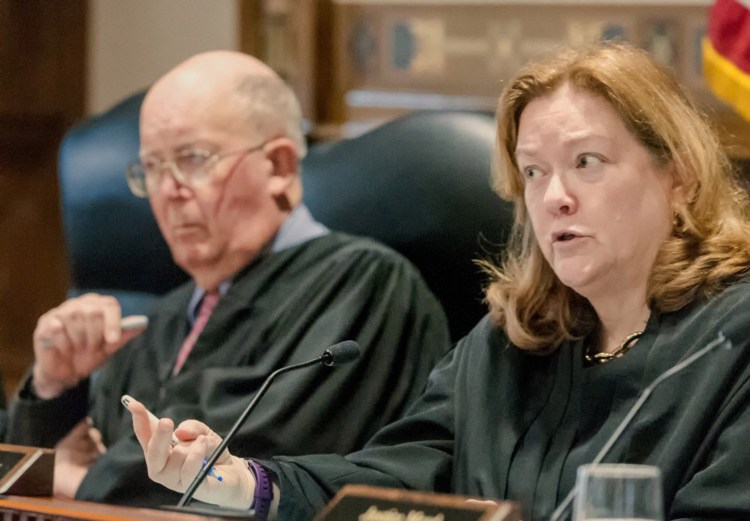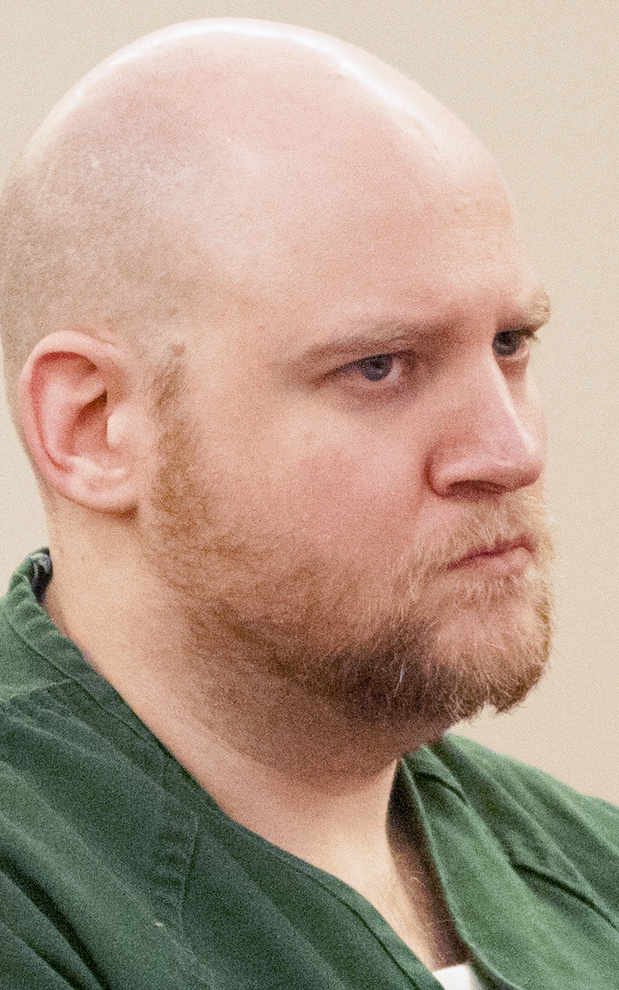AUGUSTA — The state’s highest court on Thursday heard arguments in the case of an Augusta man who sexually assaulted two boys and videotaped the acts and who says his 60-year sentence is too long and violates the state Constitution.
Wade R. Hoover, a former martial arts instructor who is now serving 40 years in prison on federal convictions for producing and possessing child pornography, some showing him abusing two boys under age 12, says the 60-year state sentence also lacks opportunity for rehabilitation.
The court arguments touched off questions about the length of prison sentences for sexual offenders in Maine and what factors should be considered.
Hoover was sentenced to 35 years for sexually assaulting a boy in Kennebec County and a consecutive 25 years for sexually assaulting a different boy in Somerset County. The sentences are to run concurrently with the 40 years from the federal case.
The state-sentenced offenses occurred December 2008 to April 2012, and Hoover’s recordings of those attacks allowed authorities to identify him. Hoover pleaded guilty to charges stemming from the attacks and was sentenced Feb. 24, 2016, at the Capital Judicial Center.
On Thursday at the adjacent Kennebec County Courthouse, more than a dozen people watched Hoover’s attorney, Scott Hess, and the state’s attorney, Deputy District Attorney Paul Cavanaugh, respond to questions from the Maine Supreme Judicial Court.
Hoover, 39, was not present during the arguments Thursday, because he is in a federal prison in Tucson, Arizona, and his release date from there is listed as Aug. 8, 2047, when he would be 69. Hoover then would begin to serve the 20 years remaining from the state sentences, making him 89 years old when he is released.
The Maine justices consider the briefs filed in the case as well as the oral arguments before ruling in writing.
Hess argued that Hoover received an excessive sentence, a “de facto life sentence,” and that Justice Michael Murphy, who presided at the sentencing hearing, did not consider Hoover’s prospects for rehabilitation.
“Not once during that sentencing analysis did the court use the word ‘rehabilitation’ in imposing that sentence,” Hess said.
Associate Justice Donald Alexander asked about the evidence of rehabilitation presented at the sentencing.
Hess said that Hoover had no criminal history and that his prospects for employment in the community would be supported by his honorable discharge from the military, in which he served combat tours.
“Felony conviction for sexual abuse? The prospects for future employment in the community ain’t too good,” Alexander told him.
Hess said people with those convictions are working in the community.
Hess started his presentation by citing shorter prison sentences imposed for murders, attempted murders, and sexual assaults in which young children were victims.
He told the judges that Hoover received a disproportionately long sentence that violated the Maine Constitution.
“In this case we have four separate charges of gross sexual assault on boys under the age of 12 where the boys were also drugged by the defendant and videotaped during the sexual assault,” Chief Justice Leigh Saufley said.
She asked, “Don’t we also have a very strong message from the Maine Legislature in recent years that gross sexual assault cases should result in a longer sentence?”
Hess agreed with her.
Associate Justice Joseph Jabar noted that the Legislature indicated “there is no limit to the sentence” in these cases.
Maine law governing imprisonment for someone convicted of gross sexual assault was amended in 2015 to say that someone convicted of assault on a child not yet 12 years old faces “a definite term of imprisonment for any term of years.”
“In determining the basic term of imprisonment as the first step in the sentencing process, the court shall select a term of at least 20 years. The court shall also impose as part of the sentence a period of supervised release to immediately follow that definite term of imprisonment,” the law reads.
Associate Justice Ellen Gorman said the Law Court indicated in two decisions involving defendant Theodore Stanislaw “the need for a pre-sentence investigation when anyone is contemplating a sentence of the length of this one” and asked why it was not done in the Hoover case.
Stanislaw, who had been a music teacher living in Blue Hill, challenged a 27-year imprisonment term imposed after he pleaded guilty to sexual assaults on five girls ages 10 to 14 from 2002 to 2008. In the second instance, the court ruled that it was disproportionate and sent it back for re-sentencing.
Both Hess and Cavanaugh said they had provided Murphy with a good deal of information about Hoover’s history and prospects for rehabilitation before the sentencing hearing. Cavanaugh also said the state did not have access to the pre-sentencing investigation report prepared by a probation officer in the federal case.
“We were very, very clear in Stanislaw that if the court and the parties were going to be talking about sentences of this length, all of that information should have been gathered in one pre-sentence investigation,” Saufley said.
In his brief, Hess wrote, “Hoover did not kill anyone. Hoover did not maim anyone. Hoover did not kidnap or threaten anyone. Hoover did not use a weapon.”
At Thursday’s hearing, Alexander also suggested the drugs could be considered a weapon in the case because of that the fact that the boys were drugged, something obvious on the recordings. “You could knock someone out with a club or you could knock them out with a drug,” Alexander said. “Either way, they’re unable to resist your attack.”
Cavanaugh maintains in his filing that the sentences are proper. He asks that the appeal be denied and urges the Law Court to uphold the sentences — 35 years for the Kennebec cases and 25 years consecutive for the Somerset case, followed by a lifetime of supervision.
On Thursday, he told the seven judges, “I think the court did a reasonable job. It could have been longer.”
In his brief, Cavanaugh recapped findings from the sentencing hearing, writing, “Mr. Hoover was each boy’s karate instructor. He had befriended the boys’ mothers. While neither boy remembered the abuse because they had been drugged, each suffered significantly from the violations of their body and trust.”
Betty Adams — 621-5631
Twitter: @betadams
Send questions/comments to the editors.




Success. Please wait for the page to reload. If the page does not reload within 5 seconds, please refresh the page.
Enter your email and password to access comments.
Hi, to comment on stories you must . This profile is in addition to your subscription and website login.
Already have a commenting profile? .
Invalid username/password.
Please check your email to confirm and complete your registration.
Only subscribers are eligible to post comments. Please subscribe or login first for digital access. Here’s why.
Use the form below to reset your password. When you've submitted your account email, we will send an email with a reset code.